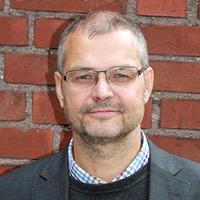RAE 2021: Digital visit week completed
Last week, KTH conducted a digital visit week within the framework of the self-initiated, comprehensive research evaluation Research Assessment Exercise (RAE).
Johan Silfwerbrand, Impact Leader at ABE and coordinator for Panel 1 and Mats Wilhelmsson, Deputy Head of School, talk about the visiting week and the next step in the evaluation.

At RAE 2021, nine panels, created based on research fields, examine KTH's research units. Each panel consisting of two to six departments where at least one expert for each research area is included. The expert panels, with members from a large number of different countries, "visited" KTH in digital form 23-27 August. The week consisted of meetings with all of the school's departments, school management, internal panel meetings and central overall meetings on KTH's impact, infrastructure and sustainability. Johan Silfwerbrand is the coordinator for Panel 1, to which all of the ABE school's departments belong.
How did the visit week go?
- I think it has gone well. The meetings that the school and our departments have conducted have been well-functioning with a good balance between presentations and discussions. Of course, conducting something like this via Zoom is not the same thing as welcoming the panel members on site on campus, but it seems that we have been able to show our research activities in a good way. The expert panel was very pleased with the school's sessions. Each department had a two-hour meeting with the experts, where presentations and question time were alternated. In total, maybe an hour of presentations and an hour of questions. We also received some follow-up questions during the current week, which Mats and I answered continuously after the meetings. It was good to have time for the panel to ask questions. Great to see that they were so interested in our activities!

Mats Wilhelmsson, Deputy Head of School, fills in.
- Really great The departments had well-thought-out sessions with good presentations. Great job! We had panel members from Canada to Australia - and thus a span of approximately 24 hours time difference at the meetings. Of course, it would have been nice to showcase our work on site on campus and to have more time to go into specific areas that are at the forefront and are important for the future. The disadvantage of digital meetings is that the informal discussions that take place during coffee or the walk to the next meeting room disappear.
What is the next step in the process?
Johan continues:
- Now we are waiting for the feedback from the experts. On September 29, the chairman of our expert panel Murray Fraser will make a presentation on the panel's conclusions for the School Management Advisory Board, and then we will get the final written report. However, the expert panel has already said that they are impressed by the research at all our departments, centres and strategic innovation programmes.
Mats tells more:
- The experts also noted that there are groups at all departments with a particularly strong research culture and an impressive amount of research results and impact, which is obviously great to hear. We are looking forward to receive the final report. RAE is very much about giving us suggestions on how we can further improve our research environments and collaborations. The report will be an important input for our discussions going forward both at school level and at the departments. Its conclusions and advice will add an important component to the work on both the school's Operational Plan for 2022, and our upcoming Development Plan, which will be launched by 2023.
The ongoing RAE was planned to be carried out in 2020 with project completion in January 2021. Due to the development of the corona virus, KTH decided to extend the process by one year until 2022. The autumn of 2020 was devoted to an internal review while the external review, with a digital visit week, was moved to August 2021. Publication of reports and project completion is planned for January 2022.
In brief, RAE is based on:
- Internal review
- External peer-review assessment
- A division of research fields in a number of panels
- Institutions as the base unit (3-6 in each panel)
- Centralised data collection to support KTH's schools
- Previous RAE (2012 and 2008)

